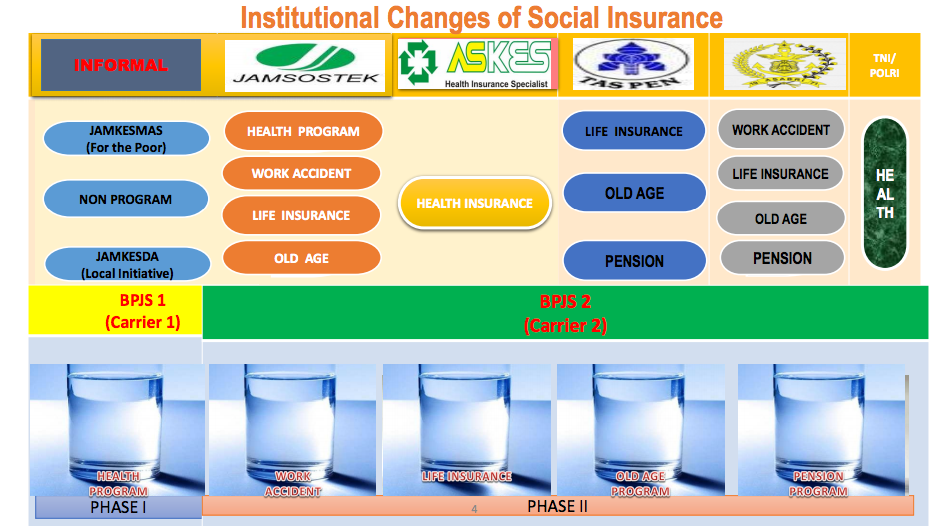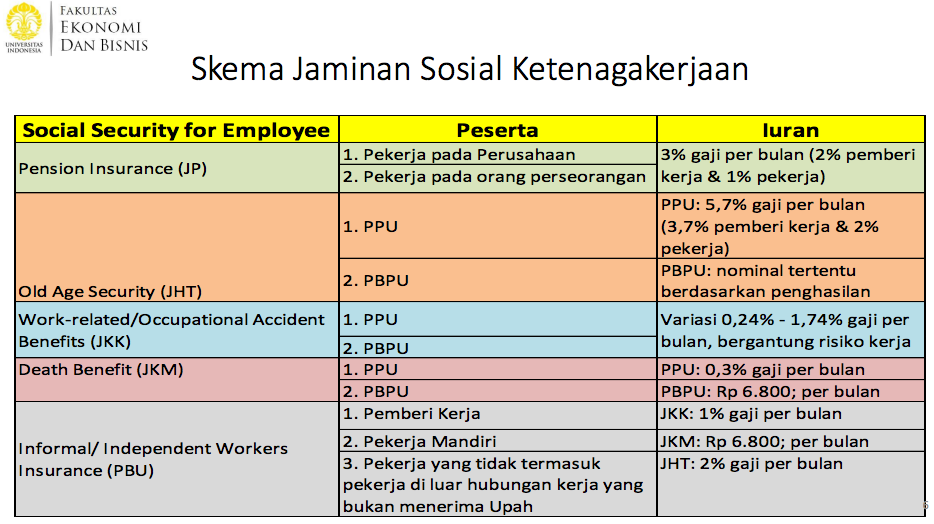Professor Sri Moertiningsih Adioetomo (Universitas Indonesia), Flora Aninditya and Dinda Srikandi Radjiman (Lembaga Demografi or Demographic Institute) presented their collaborative study on The Transformation of Social Security in Indonesia on 30 May 2017 at Lembaga Demografi Building, Depok. The seminar was also the last session of FKP series held by Lembaga Demografi and LPEM (Lembaga Penyelidikan Ekonomi dan Masyarakat or Institute for Economic and Social Research) in May this year. The seminar was divided into two parts, each of them discussed about social insurance system and social assistance as parts of social security programs in Indonesia.
Before 2014, the implementation of social insurance system in Indonesia was delegated to multiple institutions; all were owned by the state. There were only two social insurance agents that provides complete coverage in health programs, work accident, life insurance, and old age security, which were Jamsostek (Jaminan Sosial Tenaga Kerja or Worker’s Social Security) used by private workers, and a social security agent operated by the military and police force. Health insurance was operated by two different agents based on the member’s economic condition, which were Jamkesmas (Jaminan Kesehatan Masyarakat or Health Insurance for Poor and Near Poor People) and Askes (Asuransi Kesehatan or Health Insurance Specialist, designed for civil servants), while pension fund was administered by Taspen (Tabungan dan Asuransi Pensiun or Saving and Pension Fund). The fragmentation of social insurance programs was considered as inefficient, therefore causing less participation of individuals who were not classified into any of those criteria such as informal workers and their household members. Considering the growing population number and the fact that over 75% of Indonesian labor force was hired by informal job givers, the existing system was no longer sufficient. Law No. 40 of 2004 on the National Social Security System that wasthe basis of these practices in implementing social security system, was then replaced by Law No. 24 of 2014 on the Social Security Organizing Agency.
As mandated by the law, every Indonesian citizen should be registered to the universal social security program managed by a single agent named BPJS (Badan Penyelenggara Jaminan Sosial or the Social Security Organizing Agency). The first phase of the execution was intended to create a foundation for universal health insurance under BPJS Kesehatan (BPJS Health). It was initially carried out by Jamkesmas, which was later merged with other agents to operate BPJS Kesehatan in the second phase. BPJS Ketenagakerjaan (BPJS for Workers), which covers work accident, old age security, death benefit, and pension fund, was established also in the second phase of the new system implementation. Unlike previous scheme, BPJS Ketenagakerjaan includes informal workers as beneficiaries.
The presenters then described the social assistance scheme that is based on Law No. 11 of 2009 on Social Welfare in the second part. Social assistance is specifically designed to distribute assistance for the poor and vulnerable. It is important to note that social assistance is a separate program with government assistance, which focuses more on physical improvement of public goods and educational assistance. Different ministries are entrusted to implement the mandated law on social welfare in accordance with the program types. For instance, Ministry of Social Welfare is responsible for PKH (Program Keluarga Harapan or Indonesian Conditional Cash Transfer) and the budget for paying BPJS Kesehatan contribution on behalf of the poor goes to Ministry of Health.
This study is useful as a basis for further research related to the implementation of social security programs in Indonesia since the expenses and beneficiaries of social insurance program and social assistance program grow each year. Although that implies many people are now enjoying government services, assessment of the effectiveness and efficiency of what is said to be the largest universal social security system in the world, is still the top priority.






